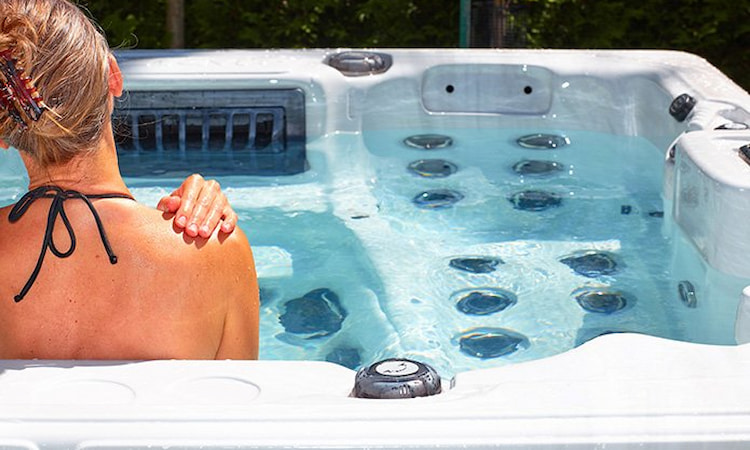You’ve been mulling over the idea of a hot tub for its therapeutic benefits, haven’t you? But you’re probably wondering, “Will my health insurance, specifically Blue Cross Blue Shield, cover the costs?”
No, Blue Cross Blue Shield typically does not cover the cost of a hot tub. Health insurance companies generally only cover treatments and equipment that are medically necessary. While a hot tub may provide certain health benefits, it is often considered a luxury item rather than a necessary medical treatment.
However, coverage can vary based on individual policies and circumstances, so it’s always best to check directly with the insurance provider.

Quick Navigation
Can a Hot Tub Be Considered a Medical Device and Be Prescribed?
Doctors are gatekeepers, their diagnosis and prescription can open the door to insurance coverage. But, it’s not as simple as just asking for a hot tub prescription.
To justify such a recommendation, your doctor must determine that the hot tub is essential for your treatment or recovery. This can include conditions like chronic back pain, arthritis, or other musculoskeletal disorders. They’ll need to document that traditional treatments have been ineffective or insufficient and that the benefits of a hot tub outweigh the risks.
The doctor’s written prescription must detail the medical necessity of the hot tub, outlining its intended use and therapeutic benefits. It’s also important that they specify the type of hot tub needed. This is because Blue Cross Blue Shield typically requires detailed medical documentation to consider coverage.
Will Blue Cross Blue Shield Pay For a Hot Tub?
Not all policies include coverage for Durable Medical Equipment (DME), and those that do may not define a hot tub as such. You’ll need to check your policy’s fine print and speak with your insurance representative for clarification.
When you consult your doctor, they need to provide detailed documentation justifying the need for a hot tub as part of your treatment plan. It’s not enough to simply write a prescription for it, the doctor must indicate how the hot tub will help manage or improve your specific medical condition.
Even if your doctor provides strong justification, and your policy covers DME, it’s not guaranteed that Blue Cross Blue Shield will deem a hot tub as medically necessary. They might suggest alternative treatments or therapies that are traditionally recognized and covered by insurance.
Will Other Health Insurance Companies Pay For a Hot Tub?
Just like with Blue Cross Blue Shield, your ability to get a hot tub covered by other health insurance providers hinges on your specific plan details and medical necessity.

You’ll find that most health insurance companies typically don’t cover items they categorize as ‘luxury’ or ‘comfort’ items, which often include hot tubs. However, if your doctor prescribes a hot tub as part of your medical treatment plan, some insurance providers might consider it.
Medicare, for example, the U.S. government’s health insurance program for seniors, does not typically cover the cost of a hot tub. Medicare Part B might cover the cost of durable medical equipment (DME) if it is medically necessary and prescribed by a doctor.
Or, UnitedHealthcare, another healthy insurance company, typically does not cover the cost of a hot tub either. However, they may go for exceptions if your doctor prescribes hydrotherapy as part of your treatment plan. Even so, they often prefer less costly alternatives, like physical therapy.
Your best bet is to contact your health insurance provider and discuss your situation. Ensure you have a detailed prescription from your doctor stating why a hot tub is medically necessary for your condition.
What is The Medical Term For a Hot Tub?
In the medical world, a hot tub is often referred to as a hydrotherapy tub or whirlpool bath. These terms are used to denote a tub of hot water used for therapeutic benefits, such as easing muscle pain and promoting relaxation.
Hydrotherapy, as you may already know, is the use of water in the treatment of different conditions, including arthritis and related rheumatic complaints. Hot tubs are a common and beneficial tool in hydrotherapy because they offer both heat and massaging jets, which can aid in easing joint and muscle discomfort.
Whirlpool baths, on the other hand, are usually used to describe more medical-grade equipment. These tubs often have powerful jets designed to target specific areas of the body. They’re commonly found in physical therapy offices or sports medicine clinics.
Frequently Asked Questions
You’ll find hot tubs can offer numerous health benefits. They’re great for stress relief, muscle relaxation, and improved sleep. Regular use can also boost circulation, aid in pain relief, and promote healthier, clearer skin.
Yes, certain medical conditions like arthritis, fibromyalgia, or chronic back pain may warrant a hot tub prescription. It’s always best to consult with your doctor about your specific health needs and potential treatment options.
Yes, you can appeal if Blue Cross Blue Shield denies your claim for a hot tub. It’s crucial to understand the denial reason, gather supporting evidence, and follow their specific appeal process thoroughly.
To get a hot tub covered by insurance, you’ll first need a prescription from your doctor stating its medical necessity. Then, submit this to your insurance company for approval. Each insurer’s process may vary slightly.
Yes, health insurance companies often cover alternative therapies like physical therapy, acupuncture, and chiropractic care. They’re also likely to cover medical devices such as wheelchairs, canes, or walkers over a luxury item like a hot tub.
Conclusion
While a hot tub can be considered a medical device in some cases, it’s unlikely that Blue Cross Blue Shield or any other health insurance will cover the costs. Each case is unique, so it’s essential to consult with your insurance provider.
The medical term for a hot tub is ‘hydrotherapy tub’, but remember, having one prescribed doesn’t guarantee insurance coverage. Always double-check with your insurance company to avoid any potential misunderstandings.






![Is Hot Tub Good for Cold? [Potential Risks & Precautions] Is Hot Tub Good for Cold](https://hottubtales.com/wp-content/uploads/2023/10/Is-Hot-Tub-Good-for-Cold.jpg)